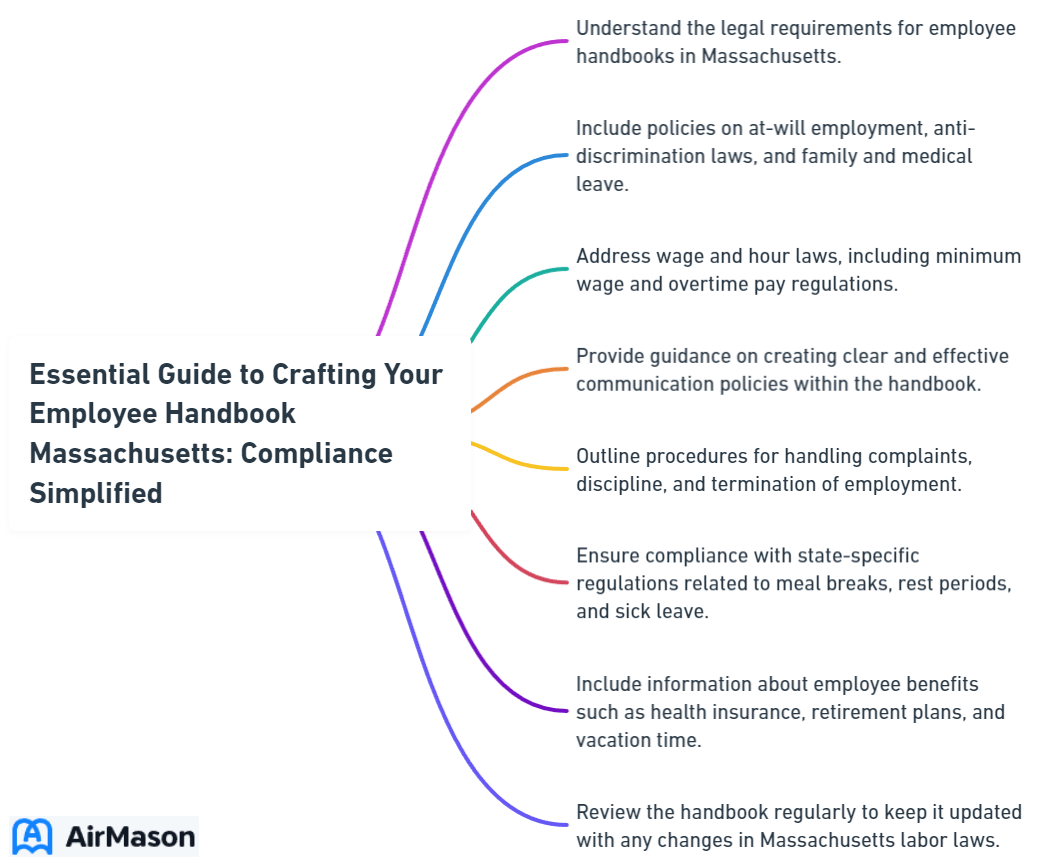
Navigating Massachusetts’ employment laws for your company’s employee handbook Massachusetts can be complex. This streamlined guide offers essential information to ensure your handbook is compliant, clear, and effective—without overlooking Massachusetts’ specific stipulations. Expect to find straightforward advice on necessary policies, procedures, and best practices that reflect your business’s legal and cultural landscape.
Key Takeaways
- The employee handbook in Massachusetts is crucial for defining the employment relationship, establishing clear expectations, ensuring legal compliance with state and federal laws, and acting as a safeguard against legal liability.
- Massachusetts employer’s handbooks must include state-specific policies like Sick Leave, Parental Leave, and Anti-Discrimination protocols, alongside federal regulations such as the ADA and FMLA, to maintain legal compliance and support employee rights.
- For effective implementation, an employee handbook must be regularly updated, properly distributed, and include a company’s culture and core values, as well as additional recommended policies to enhance workplace environment and employee satisfaction.
Essential Employee Handbook
The Essential Employee Handbook serves as a comprehensive guide for all employees deemed essential to the operation of our organization. This handbook outlines the expectations, responsibilities, and benefits associated with being an essential employee. It covers a range of topics, including work hours, safety protocols, communication channels, and emergency procedures. By familiarizing yourself with the contents of this handbook, you will gain a better understanding of your role within the company and how your contributions help maintain essential services. Additionally, the handbook provides valuable resources and contacts for any questions or concerns you may have during your employment. We encourage all essential employees to review this handbook thoroughly and refer back to it as needed to ensure a smooth and efficient workflow.
Establishing the Employment Relationship in Massachusetts

Drawing from our experience as Massachusetts employers, the initial step in crafting an effective employee handbook is to define the legal relationship between the employer and employee. It’s not just about fulfilling legal obligations; it’s about setting clear expectations from the outset, especially when hiring employees. This helps new employees understand their rights and responsibilities within the workplace, fostering a trustworthy employment relationship from the get-go.
Additionally, employee handbooks function as key documents that delineate the policies necessary for compliance with Massachusetts laws. They act as a safeguard against legal liability, providing clear documentation that supports the organization’s policies and positions. When an employment issue arises, the handbook serves as a vital reference point, easing conflict resolution and fostering a positive workplace environment.
Crafting a Legal Notice
While crafting a legal notice, it’s of utmost importance to explicitly state that the handbook doesn’t constitute an implied contract or create any legally binding obligations. This is a common misunderstanding among employees, and it’s essential to dispel it to prevent potential lawsuits. The handbook should specify that employment is at-will, meaning either the company or employee can terminate the relationship at any time, with or without cause or notice, provided there is no violation of law.
Furthermore, employers must clearly communicate that they reserve the right to modify, rescind, or alter any policies or benefits within the handbook at their discretion. This way, employers ensure flexibility in managing their workforce and adapting to changing business conditions.

Employee Acknowledgement
The acknowledgement from employees forms a significant component of the employee handbook. It serves as a receipt, confirming that the employees have received, read, and understood the handbook’s terms and policies. It also states that employees agree to abide by your company’s rules and policies as described in the handbook. The signed and dated acknowledgment form is kept in the employee’s personnel file, serving as evidence of their receipt and understanding of the policies.
By doing so, it helps ensure that all employees are on the same page regarding company policies and expectations, thereby reducing potential misunderstandings and conflicts down the line.
Key Policies for Compliance with Massachusetts Law

Adherence to state-specific policies plays a vital role in the creation of an employee handbook in Massachusetts. In our experience, Massachusetts employers, regardless of their size, are required to implement 15 state-specific policies in their employee handbooks, including Sick Leave and Parental Leave. These policies ensure that employers meet their legal obligations and protect employees’ rights under Massachusetts law.
However, it’s not just about state laws. Federal policies, such as the Americans with Disabilities Act (ADA) and the Family Medical Leave Act (FMLA), also figure prominently in Massachusetts employee handbooks. Compliance with both state and federal regulations can be a challenging balancing act for many employers. But it’s a necessary one, as it ensures that your company is following the more stringent regulation when discrepancies arise, thereby minimizing the risk of legal issues.
Paid Sick Leave Requirements
A key part of formulating your employee handbook involves understanding and incorporating paid sick leave requirements. In Massachusetts, employees earn 1 hour of sick time for every 30 hours worked, starting from their first day of employment. They can use this earned sick time to care for their own health or the health of a family member. Employers cannot require employees to find a replacement to cover their work during this time.
Also, an employee is entitled to earn and use up to 40 hours of sick leave per year. Having this policy clearly outlined in the employee handbook ensures transparency and helps employees understand their rights regarding sick leave.
Anti-Discrimination and Harassment Protocols
Having comprehensive policies prohibiting discrimination and harassment based on protected categories is paramount. Massachusetts state employment law mandates equal opportunity and prohibits discrimination based on race, creed, color, religion, national origin, sex, sexual orientation, gender identity, age, or physical/mental disability. By including clear anti-discrimination and harassment protocols in the employee handbook, employers can foster a respectful and inclusive workplace culture, provide procedures for reporting and investigating complaints, and underscore their commitment to a bias-free work environment.
Integrating Federal and State Employment Laws
Ensuring the handbook aligns with both federal and state employment laws is a vital part of guaranteeing compliance with both regulatory sets. It’s essential to remember that companies operating in Massachusetts are not legally required to document all state-specific policies in an employee handbook. However, doing so ensures that all employees have access to, and understand, the policies governing the workplace. This can be especially important for businesses with multi-state operations, where differing local laws may apply.
When discrepancies arise between state and federal laws, Massachusetts employers must align their handbook policies carefully to follow the more stringent regulation. This ensures that your company remains in compliance with both federal and state laws, thereby safeguarding your business from potential legal issues. For instance, federal laws, such as the Americans with Disabilities Act (ADA) and the Family and Medical Leave Act (FMLA), mandate the inclusion of certain policies in employee handbooks for all employers across the United States.
Family and Medical Leave Act (FMLA)
The Family and Medical Leave Act (FMLA) is one area where state and federal requirements converge. Massachusetts employers, regardless of their size, must include both federal and state-level FMLA policies in their employee handbooks.
The Massachusetts Paid Family and Medical Leave (PFML) law requires employers to provide paid leave for medical and family reasons, a requirement that goes beyond what is mandated at the federal level. Including both policies in your handbook ensures that your company is meeting its obligations under both state and federal law and that your employees are aware of their rights and benefits.
Equal Employment Opportunity
Equal Employment Opportunity is another critical area to address in your employee handbook. As Massachusetts employers, we are committed to providing equal employment opportunities and adhering to anti-discrimination laws. Our EEO policy aligns with both federal and state-specific anti-discrimination laws, ensuring comprehensive protection against discrimination in the workplace.
Including this policy in your handbook not only meets legal requirements but also sends a clear message to your employees that you value diversity and inclusion in the workplace.
Customizing Handbook Content for Your Business

Though legal compliance is a key factor in formulating an employee handbook, it’s equally important to customize the handbook according to your specific business operations, industry, and company culture. This helps ensure that your handbook is not just a dry legal document but a reflection of your company’s values and ethos. After all, the handbook is a vital tool for communicating your company’s mission, vision, and values to your employees. It sets the tone for the company culture and helps newly hired employees understand what is expected of them.
In addition to incorporating mandatory provisions, consider including optional policies tailored to your business’s operations, such as a Drug and Alcohol Abuse policy or a Technology Systems policy. These policies can be aligned with the industry in which your business operates and your company’s culture.
Also, remember to update the handbook to reflect new laws, changes in company operations, or shifts in culture. By doing so, you ensure that your employee handbook remains relevant and effective over time.
Industry-Specific Considerations
Every industry comes with its unique operational schedules, workforce demands, and regulatory environments. As such, your employee handbook should address these industry-specific considerations. For instance, if your business operates in an industry with occupational hazards, it’s crucial to include specific health and safety policies in the handbook.
Similarly, work hours, overtime, and time-off policies must be tailored to the unique operational schedules and workforce demands characteristic of your industry. By addressing these industry-specific considerations, your handbook will be more relevant and useful for your employees.
Multi-State Operations
If your company operates in multiple states, then your handbook must comply with the laws in each of these states. This can be a complex task, as different states may have differing employment laws. You might consider creating separate handbooks or supplements for different locations or employee roles.
Tools like SixFifty’s employment document tool can be helpful in crafting compliant handbooks for employees across all 50 states. In this way, you can ensure that your handbook is legally compliant and relevant to your employees, regardless of where they are located.
Updating and Distributing the Handbook Effectively

Similar to the dynamic nature of your business, your employee handbook should also evolve over time. Regular reviews and updates of the handbook are crucial to ensure that it remains aligned with evolving laws and consistent with your company’s practices. Including a record of the dates that each version of the handbook was in effect, along with version or date information on each page, helps track policy updates. This can be particularly beneficial in resolving disputes by demonstrating which policies were in force at any given time.
After the handbook is updated, a new version should be distributed to all employees, who must acknowledge receipt and understanding of the new content. This can be done electronically or in print, based on what works best for your company and your employees. Whichever method you choose, remember to maintain signed acknowledgment forms in personnel files. This serves as a record of the employee’s receipt and understanding of the handbook’s contents.
Regular Policy Reviews
Conducting regular policy reviews is a best practice that we as Massachusetts employers swear by. These reviews should be ongoing throughout the year, marking necessary revisions and updates for later compilation by a designated HR team or team member. Such regular updates reflect changes in local, state, and national regulations, as well as shifts in company culture and procedures.
By keeping your handbook updated, you ensure that it remains a reliable and relevant reference for your employees.
Methods of Distribution
In our digital age, electronic distribution of the employee handbook has become increasingly popular. It provides several advantages, such as 24/7 accessibility, cost-effectiveness, easy updates, and improved user experience with features like search and hyperlinks. However, before transitioning to a paperless handbook, it’s important to assess your workforce’s access to technology, the cultural view of electronic vs. paper documentation, and your systems’ capability to support electronic distribution effectively.
Regardless of the distribution method you choose, remember to provide employees with a new, updated copy of the handbook each time it’s updated to ensure all information is consolidated.
Additional Recommended Policies for Massachusetts Employers

We recommend including several optional policies in your employee handbook, in addition to the mandatory ones. These additional policies, such as Parental Leave and Employee Benefits Overview, can enhance employee satisfaction and promote a positive work environment. They also serve as an opportunity to showcase your company’s unique culture and values.
For instance, using gender-inclusive or non-gendered language in your handbook can demonstrate your company’s commitment to diversity and inclusion.
Parental Leave Policy
Parental leave is one such policy that can go a long way in attracting and retaining talent. While Massachusetts law mandates that employers must provide reasonable accommodations for pregnant workers, implementing a parental leave policy that exceeds state-mandated minimums can offer additional benefits.
It can improve employee morale, promote gender equality in the workplace, and demonstrate your company’s commitment to supporting its employees’ work-life balance.
Employee Benefits Overview
Another policy that we recommend including is an Employee Benefits Overview. This provides a summary of the available benefits and their eligibility criteria, without delving into the intricate details found in plan documents. It can include a description of:
- Health insurance
- Retirement plans
- Paid time off
- Employee assistance programs
- Wellness programs
- Flexible spending accounts
- Tuition reimbursement
- Employee discounts
This overview helps employees understand the employee eligibility for benefits and encourages them to take advantage of these offerings.
By including this overview in your handbook, you can ensure that employees are aware of the benefits they are entitled to, thereby enhancing their job satisfaction and engagement.
Navigating Complex Areas: Military Service and Crime Victim Leave
Understanding and incorporating complex areas such as military service and crime victim leave is a vital part of creating an employee handbook in Massachusetts. Employees eligible for domestic violence leave in Massachusetts include those who have suffered abusive behavior or who have a family member who is a victim of such behavior. Massachusetts employers are required to inform their employees of the rights and responsibilities associated with the Domestic Violence Leave Law.
By including these specific leave policies in your Massachusetts employee handbook, you can ensure compliance with Massachusetts law and provide necessary support to your employees.
Enforcing Policies and Handling Non-Compliance
The enforcement of policies and management of non-compliance is a crucial aspect that demands careful consideration when creating your employee handbook. It’s not enough to simply have policies in place; they need to be communicated clearly to your employees. This can be done by using unambiguous and simple language, organizing the handbook clearly, and making it easily accessible to your employees. These practices aid employee understanding and prevent compliance issues.
Furthermore, managers play a vital role in enforcing these policies. Training managers on the new policies before rolling them out ensures uniform interpretation and application across the company. Regular training and assessments for employees also enhance their retention and applicability in varied scenarios.
Lastly, applying consistent consequences for policy violations underscores the importance of these policies and helps maintain a professional and secure work environment.
Creating a Culturally Aligned Employee Handbook
The development of an employee handbook that mirrors your company’s culture is an integral component of creating a successful handbook. It serves as a reflection of your company’s values and ethos, providing a roadmap for employees to understand what is expected of them and how they can contribute to achieving the company’s mission.
To reflect company values in an employee handbook, it’s essential to:
- Identify the company’s culture and core values
- Create a clear mission statement
- Establish tangible reward and penalty conditions that resonate with these values
By following these steps, you can ensure that your employee handbook accurately reflects your company’s culture and values.
Moreover, the handbook should communicate that Massachusetts values diversity, equity, and inclusion, considering a wide range of characteristics, ensuring that each individual is treated fairly and feels:
- welcomed
- respected
- supported
- valued
By aligning the handbook with the company’s mission and values, you can foster a workplace culture that promotes employee satisfaction and engagement.
Summary
In conclusion, crafting an effective employee handbook is a complex but essential task for Massachusetts employers. It involves complying with both federal and state employment laws, defining the employment relationship, implementing key policies, and tailoring the content to your specific business operations and industry. Moreover, the handbook should be regularly reviewed and updated to reflect evolving laws and company practices. Above all, it should align with your company’s culture, promoting a respectful and inclusive work environment. Remember, your employee handbook is more than a legal document; it’s a reflection of your company’s values and a roadmap for your employees’ success.
Frequently Asked Questions
What are the new employment laws in Massachusetts 2023?
In 2023, the minimum wage in Massachusetts will increase to $15 an hour, while the wage for tipped employees will rise to $6.75 an hour. The Retail Premium Pay mandate for Sundays and holidays will be eliminated.
Is an employee handbook required in Massachusetts?
An employee handbook is not required by law in Massachusetts, but if provided, it can establish rights for the employee, though it may not create a contractual relationship between the employer and employee.
Why is it important to define the employment relationship in the employee handbook?
It is important to define the employment relationship in the employee handbook to set clear expectations and establish trust with new employees. This helps them understand their rights and responsibilities in the workplace.
What is the role of managers in enforcing the policies outlined in the employee handbook?
Managers play a vital role in enforcing the policies outlined in the employee handbook by ensuring uniform interpretation and application across the company. Proper training is essential for this.
Why is it important to include both federal and state-specific policies in the employee handbook?
It is important to include both federal and state-specific policies in the employee handbook to ensure compliance with all relevant laws, especially for businesses operating in multiple states. This helps in accommodating differing local laws and regulations.
Important Disclaimer:
Please be aware that the content on this page has been generated by using artificial intelligence language models and may contain errors, inconsistencies, or outdated information. It is provided as-is without any warranties or guarantees of accuracy.
We strongly recommend using this content as a starting point for further research. We disclaim any liability for damages or losses resulting from the use or reliance on this content.